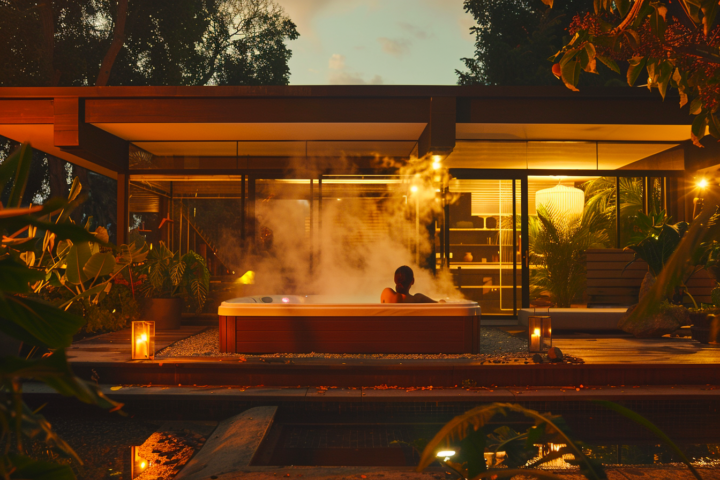
Sleep, that elusive treasure in our turbo-charged lives, often plays hard to get. For those of us searching for a gateway to better rest, a hot tub soak before bed might just be the answer. It turns out, marinating yourself in warm, bubbly water can do wonders for your sleep quality. Let’s explore how integrating a hot tub routine before bedtime can enhance your sleep.
I’ve had a hot tub for several years now. My decision to get one wasn’t influenced by any sleep-related benefits. However, I couldn’t help but notice a pattern: every time I came inside after a soak, a wave of drowsiness would wash over me. It also seemed like my sleep quality improved on those nights. My curiosity was sparked, leading me to delve into some research to understand the potential link between hot tub use before bed and better sleep.
Hot Tub Before Bed: Why This Evening Ritual Helps Us Sleep
1. What the Science Says
The scientific evidence linking the use of hot tubs for body heating with improved sleep quality is well-established. A soak in a hot tub before bed has been conclusively shown to improve both sleep onset and depth.
How? An internal clock in our brain regulates our sleep and body temperature on a 24-hour cycle, dictating when we feel sleepy or awake. Climbing into a hot tub can make us feel sleepy because it helps control this cycle, signaling to our bodies that it’s time to hit the hay.

Your Body’s Circadian Rhythm and Temperature
Our body temperature follows a daily rhythm where it’s higher in the late afternoon and lowest during sleep. Typically, one’s core temperature drops slightly before bedtime, reaching a minimum during the night, and then starts to increase, serving as a natural wake-up signal.
Immersing in warm water can help lower your internal temperature post-soak, signaling to your body it’s time to sleep. It conclusively improves:
- sleep efficiency (the ratio of actual sleep time compared to the total time spent in bed with the intention of sleeping)
- sleep onset latency (duration it takes to transition from being fully awake to sleeping)
“Body temperature, which is involved in the regulation of the sleep/wake cycle, exhibits a circadian cycle, being 2-3 degrees Fahrenheit higher in the late afternoon/early evening than during sleep, when it is the lowest. The average person’s circadian cycle is characterized by a reduction in core body temperature of about 0.5 to 1 F around an hour before usual sleep time, dropping to its lowest level between the middle and later span of nighttime sleep. It then begins to rise, acting as a kind of a biological alarm clock wake-up signal. The temperature cycle leads the sleep cycle and is an essential factor in achieving rapid sleep onset and high efficiency sleep.”
The University of Texas – “Take a Warm Bath 1-2 hours Before Bedtime to Get Better Sleep, Researchers Find”
Soaking in a hot tub activates the body’s mechanism for regulating heat, significantly boosting blood circulation from the core to the extremities. The warm water dissipates your body’s heat and lowers your core temperature. Thus, immersing in a hot tub about 1-2 hours before sleep time complements the body’s natural sleep cycle, enhancing the likelihood of not just falling asleep more swiftly but also enjoying a higher quality of rest.
2. A hot tub’s warmth, buoyancy, and jet massage work together to relax both our body and mind.
Sitting in a hot tub not only eases our muscles and joints but also helps to dissolve the day’s tensions. It eases the strain on every part of our body, melting away any lingering stress.
3. Hot tubs encourage relaxing behaviors.
To prepare for sleep, sleep specialists often suggest a clear mind free from distractions, emphasizing the importance of putting aside cell phones and other gadgets. Hot tubs naturally enforce this advice by creating an environment where electronics must be kept at bay, encouraging individuals to fully engage in the moment and the soothing effects of the soak.
4. Alleviating pain promotes better sleep.
20% of US adults suffer from chronic pain. We don’t need an expert to tell us that pain makes sleeping more difficult. Fortunately, hot tubs are effective at alleviating some common types of pain by pushing lactic acid out of your muscles. Spending time in a hot tub can make it easier to find a comfortable sleeping position and enjoy restful sleep without discomfort.
The Perfect Hot Tub Routine for Better Sleep
Time Your Soak
For optimal sleep benefits, soaking in a hot tub 60 to 120 minutes before bedtime can significantly impact sleep quality, giving your body enough time to cool down.
Use Ideal Water Temperatures
Consider a water temperature range of 100°F to 104°F (37°C to 40°C) ideal for a relaxing soak without causing the body to overheat.
Don’t Stay in too Long!
A 20 to 30-minute session is sufficient to reap the sleep-promoting benefits without risking dehydration or overheating.
Maximizing the Benefits: Tips and Tricks
Ambient Setting: Lights and Sounds
Creating a relaxing ambiance with dim lights and soft, soothing sounds can further promote relaxation and readiness for sleep.
Post-Soak Care
First rinse off under warm water. While a cold shower may appeal to some, it can inadvertently elevate your body temperature, reversing the benefit achieved in your soak. Next, make sure you drink a bit of water to stay hydrated. If you limit your soak to 20 or 30 minutes, you won’t need much (you don’t want to have to take a trip to the bathroom in the middle of the night!)
Climb into bed and get comfortable!
One more thing: When you climb into bed, we recommend buckwheat pillows for optimal neck and head support!
Try improving your sleep with a soak in your hot tub before bed tonight!
The ritual of soaking in a hot tub before bed offers proven benefits to those seeking to enhance their sleep quality. By following the tips and considerations outlined, individuals can safely incorporate this practice into their nighttime routine, potentially transforming their sleep.
We’d love to hear from you. Share your experience with your hot tub and sleep in the comments below!
